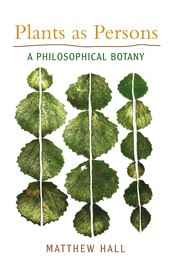Check nearby libraries
Buy this book

Challenges readers to reconsider the moral standing of plants.
Plants are people too? Not exactly, but in this work of philosophical botany Matthew Hall challenges readers to reconsider the moral standing of plants, arguing that they are other-than-human persons. Plants constitute the bulk of our visible biomass, underpin all natural ecosystems, and make life on Earth possible. Yet plants are considered passive and insensitive beings rightly placed outside moral consideration. As the human assault on nature continues, more ethical behavior toward plants is needed. Hall surveys Western, Eastern, Pagan, and Indigenous thought, as well as modern science and botanical history, for attitudes toward plants, noting the particular resources for plant personhood and those modes of thought which most exclude plants. The most hierarchical systems typically put plants at the bottom, but Hall finds much to support a more positive view of plants. Indeed, some Indigenous animisms actually recognize plants as relational, intelligent beings who are the appropriate recipients of care and respect. New scientific findings encourage this perspective, revealing that plants possess many of the capacities of sentience and mentality traditionally denied them
"All those who depend on plants should critically read Plants as Persons ... I highly recommend Plants as Persons as a challenging read for any carnivores, PETA advocates, or emerging academics; the book is thought-provoking for omnivores, medical practitioners, life science enthusiasts, and philosophers ... If you are fascinated by plants, you will want this for your personal collection." - Katie Kamelamela, Economic Botany
"Overall, this book is a 'must read' for anyone interested in the state of the environment today, whether professionally or as a concerned citizen. It does not simplify the issues but has managed to attain that elusive balance between remaining accessible and readable without sacrificing intellectual range, subtlety and complexity of thought." - Australian Humanities Review
"Dr. Hall does a wonderful job of presenting many layers of research and insight in a very organized way. His introduction outlines the content of his book clearly and each chapter ends with a helpful summary and a smooth transition into the next topic of discussion. There is a lot of information to think about in Plants as Persons. All of it enlightening. Now here is a book that is hard to put down." - ArtPlantae Today
"If you are someone who thought philosophy began and ended with Aristotle and Socrates, then this book will be an eye opener ... [it] explains that plants are active, self-directed, and even intelligent. Hall puts forward the view that nature is a communion of subjective, collaborative beings, organizing and experiencing their environment." - Chicago Botanic Garden
"The extension of ethics to the nonhuman, nonanimal is important, and ahead of its time. What a pleasure to experience this well-written, well-researched, interesting approach to applied comparative philosophy. Matthew Hall makes an outstanding contribution to a new and important field of study." - Christopher Key Chapple, author of Yoga and the Luminous: Patañjali's Spiritual Path to Freedom
"Ever since the publication of Peter Singer's Animal Liberation, many readers have been waiting for the other shoe to fall: plant liberation. This book gives it to us. It will be the poster child for the plant liberation movement, if ever there is such a thing." - Loyal Rue, author of Everybody's Story: Wising Up to the Epic of Evolution
"This wide-ranging analysis is exactly what is needed to understand the complex character of contemporary human-Earth interactions. It is a significant contribution to our understanding of plants in the discourse on environmental concerns." - John Grim, cofounder of the Forum for Religion and Ecology, Yale University
Check nearby libraries
Buy this book

Previews available in: English
Subjects
Botany, PhilosophyShowing 2 featured editions. View all 2 editions?
| Edition | Availability |
|---|---|
|
1
Plants As Persons: A Philosophical Botany
2011, State University of New York Press
in English
1438434308 9781438434308
|
zzzz
Libraries near you:
WorldCat
|
|
2
Plants as persons: a philosophical botany
2011, State University of New York Press
in English
1438434294 9781438434292
|
aaaa
Libraries near you:
WorldCat
|
Book Details
Table of Contents
Edition Notes
Includes bibliographical references (p. 209-227) and index.
Classifications
The Physical Object
ID Numbers
Community Reviews (0)
Feedback?History
- Created October 20, 2011
- 10 revisions
Wikipedia citation
×CloseCopy and paste this code into your Wikipedia page. Need help?
| August 27, 2024 | Edited by MARC Bot | import existing book |
| July 29, 2024 | Edited by susan.w.albert | Edited without comment. |
| December 22, 2022 | Edited by MARC Bot | import existing book |
| January 27, 2022 | Edited by ImportBot | import existing book |
| October 20, 2011 | Created by LC Bot | Imported from Library of Congress MARC record |











